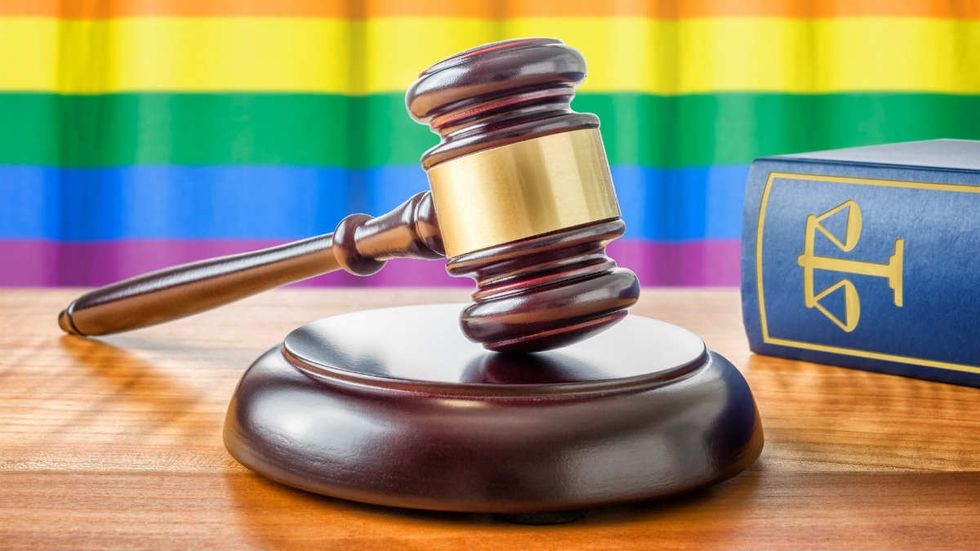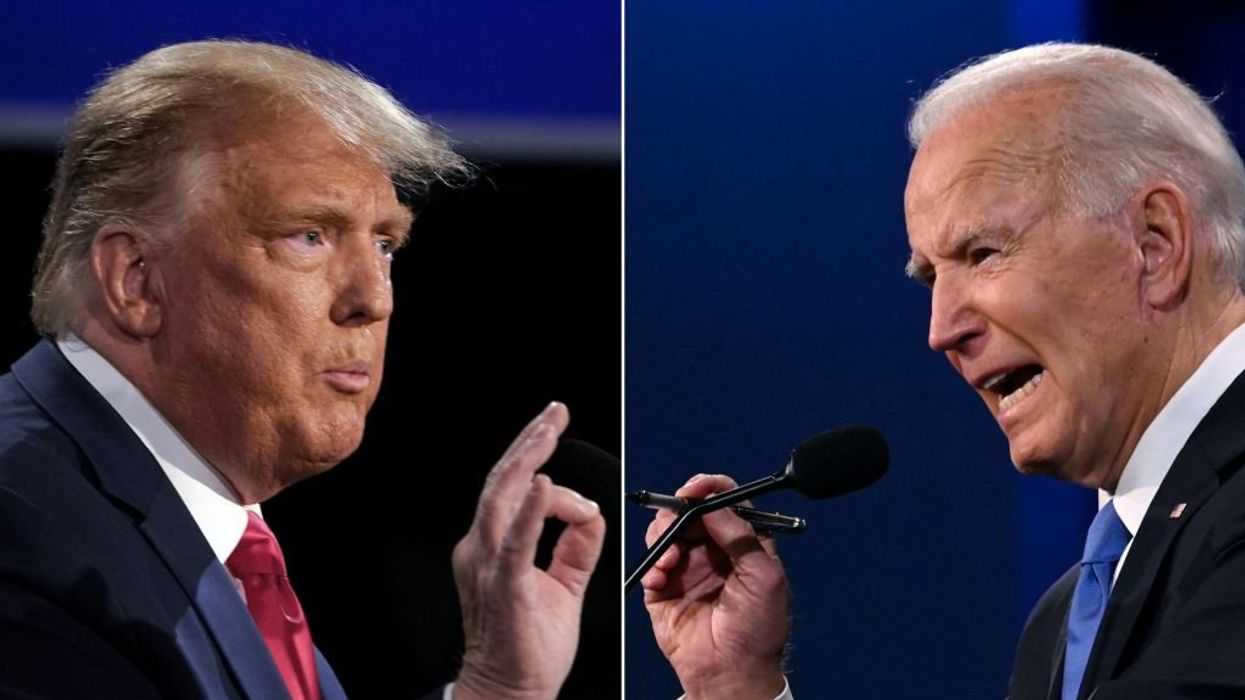
© 2024 Blaze Media LLC. All rights reserved.
While everyone is focusing on the Senate’s “nuclear warfare” over Neil Gorsuch’s nomination to the Supreme Court, the lower courts, which decide most cases, are remaking society and our entire system of government every week. Last week, Venezuela’s supreme court attempted to abolish the country’s legislative body. After having adopted Venezuela’s health care system, it appears that we are now adopting their judicial system, allowing even lower courts to nullify Congress.
Rewriting the Civil Rights Act from the bench
Not a single individual who voted for the Civil Rights Act in 1964 could have envisioned applying the law to homosexuals and cross-dressers, but unelected judges have now retroactively codified their social agenda into statute because … who needs legislatures? In an 8-3 en banc ruling in the case Hively v. Ivy Tech Community College of Indiana, the U.S. Court of Appeals for the Seventh Circuit unilaterally amended Title VII of the Civil Rights Act to include sexual orientation and a slippery slope for the whole sexual identity alphabet soup. And once again demonstrating the imbalance on the courts, every Democrat appointee voted to illegally amend the statute, while five of the eight GOP appointees on the panel agreed with them.
The plaintiff, Kimberly Hively, sued Ivy Tech Community College, arguing that she was denied an employment opportunity as full-time professor at the South Bend, Indiana, campus of the institution because she identifies as a lesbian. As such, she claimed that the school violated Title VII of the Civil Rights Act, which prohibits employment discrimination based on “race, color, religion, sex and national origin.” Notice the statute doesn’t prohibit discrimination based on height, odor, or size of biceps. Nor does it cover aspects of gender identity beyond biological sex. The statute is the statute.
This is a superlative case demonstrating the problem we have with the judiciary. Let’s assume that Ms. Hively was legitimately discriminated against. This is where it’s important for people of all political persuasions to recognize the difference between the role of legislatures or Congress in politics and the role of the courts in interpreting the law.
Since I’m never going to run for office, I can state the truth about the Constitution. Constitutionally speaking, a business or an institution has the right to run its affairs the way it wants and to hire whomever the owners and management desire to employ. They can decline to hire people for prudent reasons, dumb reasons, or downright mean reasons. Title VII has long been viewed by conservatives as a very dubious exercise in post-constitutionality and a violation of property and free association rights. Nonetheless, it was justified because, for blacks in particular, basic property rights were not respected for far too long, and this law was deemed necessary to ensure true equality — at least to correct entrenched segregation codes and attitudes of the Jim Crow era. But for anyone to expand the reach of the statute beyond its textual meaning and its clear intent is indefensible.
The word “sex” means male or female. By definition, the entire sexual identity movement is self-contradictory. One cannot possibly claim attraction to one sex or claim to be one sex while denying a distinction between sexes! Thus, everyone must agree that not only the legislative intent of Title VII but the statutory language itself includes only discrimination against a woman because she is a woman or a man because he is a man. Judge Diane Sykes, who was on Trump’s short list for the Supreme Court, drove home this point in her dissent by illustrating the absurd outcome of this decision:
If the facts show that Ivy Tech hired heterosexuals for the six full-time positions, then the community college may be found liable for discriminating against Hively because of her sex. That will be so even if all six positions were filled by women. Try explaining that to a jury.
Hence, sexual orientation and gender identity, by definition, cannot be simply read into the statute because activist judges think it would be a nice thing to do. Democrats and progressive Republicans in Congress have tried to make this change legislatively for decades and have failed to garner the necessary support for it every time.
Discrimination is now subject to the whims of judiciary
In fact, since 1994, members of Congress have consistently tried to amend Title VII to include the modern sexual identities, but their efforts were rejected. And for good reason. Unlike race, sexual orientations and identities are highly subjective and ever-evolving with every passing year based on what’s in vogue with the cultural Marxists. While nobody wants baseless discrimination, the effort to enshrine a litany of behaviors into immutable laws of nature opens a can of worms that will disrupt commerce and harm religious and civil liberty.
However, these are all political arguments. Even ardent supporters of the legislation cannot say in good conscience that a court can gaily codify legislation that never passed Congress simply because of the judges’ political beliefs. Yet that is exactly what Judge Richard Posner … yes, that Judge Posner … said in a concurring opinion — that the 1964 law “invites an interpretation that will update it to the present.”
At least we should give Posner points for honesty — and then proceed to impeach him. Here is the conclusion of his concurrence:
I would prefer to see us acknowledge openly that today we, who are judges rather than members of Congress, are imposing on a half-century-old statute a meaning of “sex discrimination” that the Congress that enacted it would not have accepted. This is something courts do fairly frequently to avoid statutory obsolescence and concomitantly to avoid placing the entire burden of updating old statutes on the legislative branch. We should not leave the impression that we are merely the obedient servants of the 88th Congress (1963–1965), carrying out their wishes. We are not. We are taking advantage of what the last half century has taught.
This sentiment fits well with a number of past statements from Posner, including his contention that “the time to look at precedent, statutory text, legislative history, that’s after you have some sense of what is the best decision for today.”
Posner is right at least in one respect: Courts do this fairly frequently, and the majority of judges share this view in some form. This cuts to the foundation of our republic and is the reason why judicial review is the single most important issue of our time.
An irremediable judicial autocracy
Essentially, there is now a super-majority of judges on the lower courts, as well as five Supreme Court justices (and sometimes John Roberts), who will look at the political outcome of an individual case first and backfill their “jurisprudence” to support that predetermined outcome. Thus the unelected branch of government now has the sole and final say over constitutional and statutory interpretation, even when it is clear that the judges are nakedly engaging in an illegal ad hoc constitutional convention. It should also be noted that even a ruling as radically divorced from statute as this one was supported by most of the GOP appointees on the panel. Which proves my broader point that almost all the circuit courts are irremediably broken.
The courts have redefined life, marriage, the most immutable laws of nature and sexuality, and have now redefined our borders and citizenry. With every such case, it becomes increasingly apparent that there is simply nothing a court can do that will spur conservatives to finally promote real judicial reform over simply searching and hoping for “good judges.”
Given that there is a long history of circuit courts rejecting the arguments of the Seventh Circuit (the First, Second, Third, Fourth, Sixth, Eighth, Ninth, and Tenth Circuits have all rejected such claims over the years), including a recent ruling from the Eleventh Circuit (Evans v. Georgia Regional Hospital) siding with the long-standing statutory language, it is likely that this case will head to the Supreme Court for next term. Sadly, we already know that Anthony Kennedy is all about politics, not the law, when it comes to the sexual identity movement.
This case further proves the point that Neil Gorsuch’s nomination alone will not change anything. Even if he were on the level of a Scalia, an assumption of which I’m highly skeptical, this would merely reset the court back to the whacko Obergefell balance. The only option is judicial reform.
Want to leave a tip?
We answer to you. Help keep our content free of advertisers and big tech censorship by leaving a tip today.
Want to join the conversation?
Already a subscriber?
Blaze Podcast Host
Daniel Horowitz is the host of “Conservative Review with Daniel Horowitz” and a senior editor for Blaze News.
RMConservative
more stories
Sign up for the Blaze newsletter
By signing up, you agree to our Privacy Policy and Terms of Use, and agree to receive content that may sometimes include advertisements. You may opt out at any time.
© 2024 Blaze Media LLC. All rights reserved.
Get the stories that matter most delivered directly to your inbox.
By signing up, you agree to our Privacy Policy and Terms of Use, and agree to receive content that may sometimes include advertisements. You may opt out at any time.



